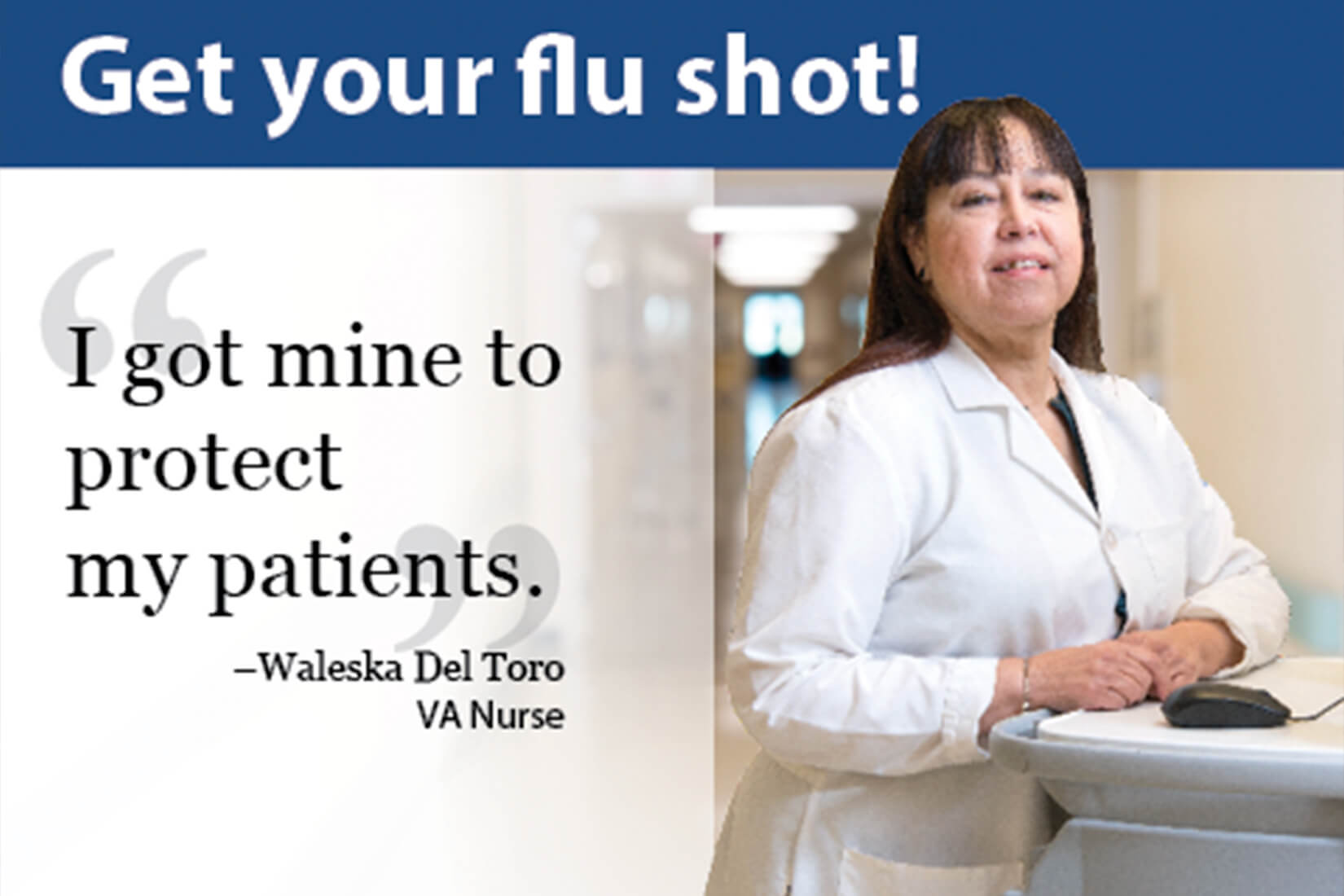While intimate partner violence in the military population has been found to occur at about the same rate as the civilian population, servicemembers and veterans face unique challenges: a lack of separation between home and work life, long separations from family and repeated exposure to combat and other traumatic situations.
Is Prandial Insulin or Noninsulin Agent Better for T2D Treatment Intensification?
Some veterans with type 2 diabetes patients can’t reach their hemoglobin A1c goal despite using metformin, basal insulin and a sulfonylurea. What should come next?
New Device Improves Balance in 100% of Veterans with Gulf War Illness
A new device that corrects vestibular dysfunction could be a key to treating many of the symptoms affecting the approximately 300,000 veterans who suffer from Gulf War Illness.
‘Severe’ 2017-18 Influenza Season Hit VA Especially Hard
This likely will come as little surprise to healthcare professionals who soldiered through it, but the 2017-18 influenza season was the most severe since VA surveillance was initiated in 2009.
Better Survival for NSCLC Patients Treated by Military Medicine
Does universal healthcare access provided by the MHS translate into improved patient outcomes for non-small cell lung cancer?
Increasing Usage of SSRIs for Dementia Symptoms
Emerging data has suggested effectiveness for selective serotonin reuptake inhibitors for treatment of behavioral and psychological symptoms of dementia.
Caution Urged in Use of Sulfonylureas in Some T2 Diabetes Patients with CAD
VA clinicians should exercise caution with use of sulfonylurea in some patients with co-morbid type 2 diabetes and cardiovascular disease, according to new research.
Hypoglycemia Concerns Help Drive Use of Continuous Glucose Monitoring at VA
As the VA increases its focus on minimizing hypoglycemia in veterans with type 2 diabetes, it expects that more physicians and veterans will consider using continuous glucose monitors to meet that goal.
Veterans Study Calls for Better Guidance on Lung Cancer Treatment
With increased imaging now detecting lung cancer nodules in sicker patients, a new report suggested that guidelines should be more directive in how to maximize benefit and minimize harm, while taking into account comorbidities and life expectancy.
Benzodiazepines Increase Suicide Risks in Veterans With Co-Morbid COPD/PTSD
Many clinical guidelines specifically recommend against prescribing benzodiazepines to patients with chronic obstructive pulmonary disease and post-traumatic stress disorder.
NASA Partners with Academia for CVD Prediction Tool in Younger Adults
Federal medicine played a crucial role in the development of a new online tool to better predict which middle-aged adults are at the greatest risk of having acute myocardial infarction or stroke over the next decade.
Intensive Short-Term Therapy More Effective for PTSD in Veterans
Short-term intensive outpatient treatment is more effective for post-traumatic stress disorder in military veterans than longer-term therapy, a new study suggested.
RA Fracture Risk Affected by Glucocorticoid Treatment
How much does systemic glucocorticoid exposure increase fracture among patients with newly-diagnosed inflammatory and immune-modulated conditions, including rheumatoid arthritis.
Obesity, Weight-Loss Both Worsen RA U.S. Medicine
Obese patients with rheumatoid arthritis report greater disability in cross-sectional studies, but what that means over the long term has not been studied often.
Opioid Prescription Delays DMARD Initiation
What factors can cause delays in initiation of initial disease-modifying antirheumatic drug, or DMARD, in patients newly diagnosed with rheumatoid arthritis (RA)?
Outcomes of Genitourinary Injuries in Recent Veterans
The diagnosis and coordination of care for veterans with genitourinary injury can be improved, a new study found.
E. Coli in Poultry Linked to UTI Outbreaks
Gastrointestinal upset isn’t the only risk from a strain of Escherichia coli (E. coli) found in retail chicken and turkey products.
Most Patients Have Issues With In-Dwelling Catheters
Patients have more issues than healthcare providers might realize with complications from indwelling urethral catheters, including both infectious and non-infectious problems.
VA/National Cancer Institute Partnership Increases Veteran Access to Trials
Thanks to a new partnership between the National Cancer Institute and the VA, veterans with cancer will now have greater access to potentially lifesaving clinical trials.
VA Continues Hepatocellular Screening, but Study Questions the Value
Although a recent study determined that screening veterans with cirrhosis for hepatocellular carcinoma did not reduce the risk of death associated with liver cancer, the VA has no plans to change its screening practices.
Could Bilirubin Measurements Predict, Prevent CV Events in HIV Patients?
For most people, mention of bilirubin, which is formed after the breakdown of red blood cells and is eliminated by the liver, elicits thoughts of jaundice—which occurs when the compound is too high.
VA Pilots Automated Nationwide MDRO Alert System
The VA has successfully piloted a nationwide system to alert VA facilities when patients are admitted with a history of infection with two challenging multidrug resistant organisms (MDROs).
Testosterone Therapy Not Linked to Aggressive Prostate Cancer in Veterans
Clinicians prescribing supplemental testosterone in men with low levels always have a nagging concern about the possible link between increasing hormone levels and prostate cancer.
Protocols to Prevent Pathogen Transmission Often Violated in Hospitals
Precautionary practices to prevent infectious agent transmission in hospitals often fail, according to a study looking at 325 patient rooms, including some at a VAMC.
Rural Veterans With MS Benefit from Clinical Video Telehealth Rehabilitation
Of the more than 28,000 veterans with multiple sclerosis (MS) who receive care at the VHA, almost 45% of them live in rural or highly rural areas, a recent conference presentation pointed out.
Flu Vaccination Rates Up for VA Health Care Staff, But Still Lag National Average
While the VA significantly lags behind other healthcare systems in mandating influenza vaccinations for healthcare workers, according to recent research, it is moving closer to the national average because of a directive issued last fall.
DoD Analysis Shows Flu Vaccine More Effective Than Expected in 2017
Predictions that the influenza vaccine would be largely ineffective in the U.S. based on results seen in Australia the previous summer troubled many federal infectious disease specialists going into last year’s flu season.
Side-effects Differ Between Radiation Therapies for Prostate Cancer
A recent study compared patient-reported disease-specific functional outcomes after external beam radiation therapy (EBRT) and EBRT combined with low-dose-rate brachytherapy prostate boost (EB-LDR) among men with localized prostate cancer.
Parkinson’s Drug Not Associated With Higher Prostate Cancer Risk
An increased incidence of prostate cancer was observed in Parkinson’s disease (PD) patients treated with entacapone during a pre-approval randomized clinical trial, according to a new study which noted that the relationship had not yet been intensely investigated.
Metformin Promising for Improving Prostate Cancer Survival
Metformin, a commonly used drug for patients with Type 2 diabetes mellitus (DM), has shown promise in helping to treat prostate cancer (PCa), according to a new study.




